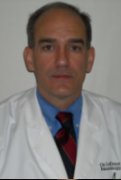Mark Ledoux, M.D., PhD
2012 Symposium Guest Speakers
Mark Ledoux, M.D., PhD
Professor of Neurology, University of Tennessee Health Science Center
 Dr. LeDoux is a professor of neurology at the University of Tennessee Health Science Center, as well as the director of both the Dystonia Clinic and the Movement Disorders Research Laboratories. He is the recipient of several awards, including the Dystonia Doctor of Excellence Award from the Dystonia Medical Research Foundation. He is interested in researching the pathophysiology of dystonia, mechanisms of cell death in Parkinson’s disease, molecular networks that participate in sensorimotor plasticity and computational organization of motor systems, and cranial parasympathetic neurotransmission. Dr. LeDoux has recently published about Parkinson’s disease and primary dystonia.
Dr. LeDoux is a professor of neurology at the University of Tennessee Health Science Center, as well as the director of both the Dystonia Clinic and the Movement Disorders Research Laboratories. He is the recipient of several awards, including the Dystonia Doctor of Excellence Award from the Dystonia Medical Research Foundation. He is interested in researching the pathophysiology of dystonia, mechanisms of cell death in Parkinson’s disease, molecular networks that participate in sensorimotor plasticity and computational organization of motor systems, and cranial parasympathetic neurotransmission. Dr. LeDoux has recently published about Parkinson’s disease and primary dystonia.
Over the past twenty years, most of my research has been focused on the etiology and treatment of dystonia. My work has been split between the lab and clinic. I am a board-certified neurologist with subspecialty expertise in movement disorders. In the clinic, I inject botulinum toxins and program deep brain stimulators in patients with various types of dystonia including spasmodic torticollis or cervical dystonia. In the lab, I use tools from physiology, genetics and molecular biology to study the causes of dystonia.
Brief Summary of Presentation
My first talk, entitled “Spasmodic Torticollis – Phenomenology, Classification and Diagnostic Evaluation” will cover important features of spasmodic torticollis such as sensory tricks or gestes antagonistes, risk for spread to other body parts and the possibility of spontaneous resolution. In addition, I will outline a typical diagnostic workup to exclude secondary and other causes of spasmodic torticollis.
My second talk will concentrate on the “Genetics of Spasmodic Torticollis.” About 10% of patients with primary dystonia have at least one first- or second-degree relative with dystonia. Within the past few years, two genes (THAP1 and CIZ1) have been causally-associated with primary dystonia. These genes encode proteins involved in cell cycle control. A large number of other genes involved in various cellular functions have also been linked to secondary dystonias. My talk will attempt to simplify the complex genetics of spasmodic torticollis.

